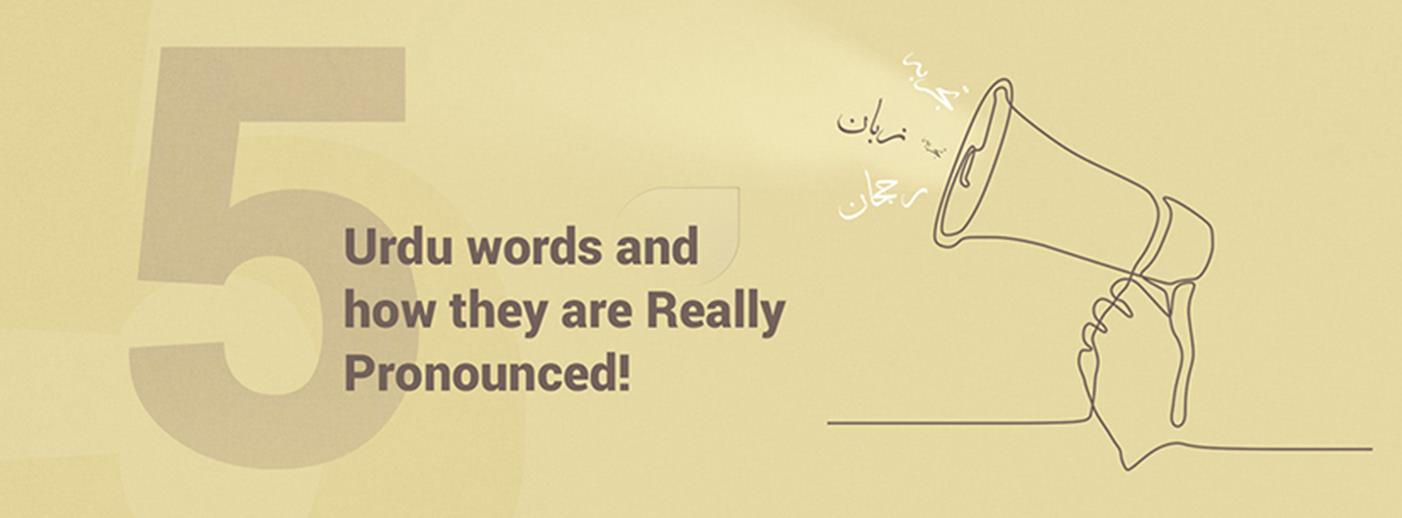अधिक खोजे गए शब्द
सहेजे गए शब्द
खिस्यानी बिल्ली खम्बा नोचे
जिसे क्रोध आ रहा हो वह अपनी खीझ या क्रोध दूसरों पर उतारता है, लाचारी में आदमी दूसरों पर क्रोध करता है, लज्जित व्यक्ति दूसरों पर अपनी लज्जा उतारता है, निर्बल की खीझ
कोशिश
कोई काम करने के लिए विशेष रूप से किया जानेवाला प्रयत्न, मेहनत, दौड़ धूप, प्रयत्न, प्रयास, चेष्टा, उद्योग, श्रम, उद्यम, उपाय, परिश्रम
आठ बार नौ त्योहार
सुख-सुविधा और आराम का शौक़ या लगन ऐसा बढ़ा हुआ है कि युग और समय उसको अल्प व्यय नहीं करने देता
चमनिस्तान
ऐसा बाग़ जहाँ फूल ही फूल हों, ऐसी जगह जहाँ दूर तक फूल ही फूल और हरा भरा नज़र आए, वाटिका, चमन, बाग़
दादरा
संगीत में एक प्रकार का चलता गाना (पक्के या शास्त्रीय गानों से भिन्न), एक प्रकार का गान, एक ताल
5 Urdu words and how they are Really Pronounced!

A word’s actual utterance getting vulgarized in our everyday speech, is just Uber-common.
Let’s take the word pronunciation itself, how often do we hear it as Pro-noun-ci-ation?
Almost always! The little ‘nun’ nearly inevitably becomes ‘noun’. Why?
Maybe it’s easier that way; or, the word ‘Pronounce’ drives us to do so; or, that’s how we’ve heard it and have simply picked it up!
Mostly, it’s the third reason – hearing – that’s what pronunciation, or Talaffuz, as they say in Urdu, is all about.
For today let’s scour through 5 such commonplace words that we’ve been uttering else-ways!
1. Tajraba
Meaning experience, and sometimes experiment, this word is pronounced, almost off-the-cuff, as Ta-Jar-Baa, however, its actual pronunciation is ‘Taj-ra-Ba’.
Nowadays, even poets are getting it wrong, making their Ghazals out of meter. If you’re a budding poet and are trying to get along with prosody, you’ve got to know its uttered right. One little syllable here and there, and you’re off!
2. Ruj’haan
Ahh, this one’s really on the news anchors; ‘Chunaav ke Shuru’aati Rujhaanaat bataa rahe hain kih…’
The word means bent or inclination and unfortunately is inflected wrong. So, what’s wrong about it?
See the little apostrophe above, between J and H? Therein lies the error.
It’s an Arabic word with the root Raj’h, one which also gives us the word Tarjiih, or preference.
It is correctly spoken as ‘Ruj-Haan’, not ‘Ru-JHaan’. You see there is no ‘Jh’ (as in Jhankaar) in Arabic. The J and H are two different letters with their own distinct sounds.
A similar word is Mash’huur with SH and H having their own voice. Although, it too, is being mispronounced, we do sometimes hear the right utterance: ‘Mash-Huu-R’.
3. Su’aal
Another prototype error, however, no one can claim it!
This is our very own Sawaal, or question. Although it also means begging, it is rarely used in that sense anymore. Remember the Qawwali, ‘Shirdi wale Sai Baba, aaya hai tere dar pe Sawaalii’? Suaali there means beggar.
About the pronunciation, there is no ‘w’ sound in it, it has just tagged along since the script shows for it: سؤال
Earlier, people used to mark the vaav with a Hamza to show the little ‘u’ vowel sound. But soon that diacritic was dropped and Su’aal turned into Sawaal.
4. Pech-Kash
Yes, it’s Pech-Kash, not Pech-Kas!
How did we go astray on this one? Perhaps because of the Hindi verb Kasnaa or to tighten, for that’s what a screwdriver is supposed to do.
Pech means a twist or coil (screw), and the Kash comes from the Persian Kashidan meaning drawing, pulling, or carrying. Thus, Pech-Kash.
What a strange error it is, isn’t it? A Pech-Kash, literally screw-puller, becoming Pech-Kas, literally Screw-tightener.
The silver-lining with mispronunciations!
5. Zabaan
The bedrock of all languages, Zabaan or tongue, is often itself misspoken as Zubaan.
The ‘u’ vowel sound is actually quite a recent addition; perhaps brought forth by film songs, who knows?
Interestingly, the original word was Zafaan, and meant flame; that’s why we frequently come across the compound Zabaan-e-Sham’, or the tongue of the candle, in classical poetry. Because the flame looks like a tongue.
Gradually, the ‘F’ has changed into ‘B’, and now the vowels, too, are flickering “u-round”!
No apologies for the word punning.
Delete 44 saved words?
क्या आप वास्तव में इन प्रविष्टियों को हटा रहे हैं? इन्हें पुन: पूर्ववत् करना संभव नहीं होगा





